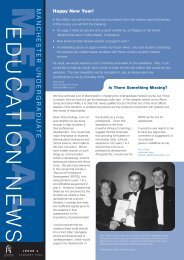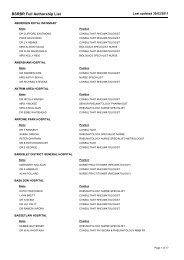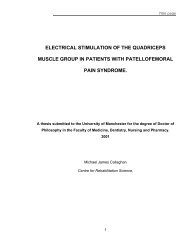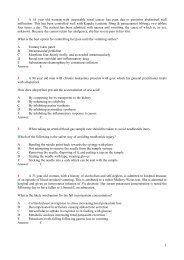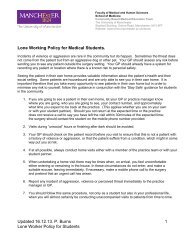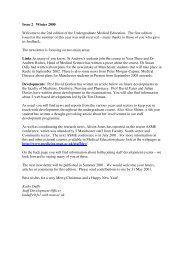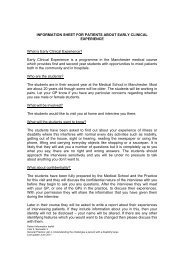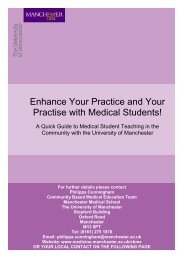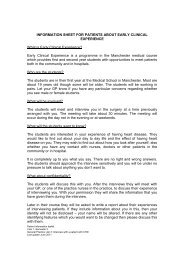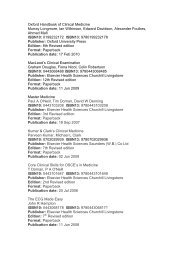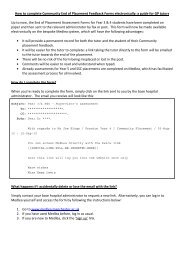Academic Mentoring Programme for Clinical Scientists in - School of ...
Academic Mentoring Programme for Clinical Scientists in - School of ...
Academic Mentoring Programme for Clinical Scientists in - School of ...
You also want an ePaper? Increase the reach of your titles
YUMPU automatically turns print PDFs into web optimized ePapers that Google loves.
<strong>Cl<strong>in</strong>ical</strong> <strong>Academic</strong> <strong>Mentor<strong>in</strong>g</strong> <strong>Programme</strong> <strong>for</strong> <strong>Academic</strong> Tra<strong>in</strong>ees <strong>in</strong> theNorth West(Manchester <strong>Academic</strong> Health Science Centre/University <strong>of</strong>Manchester/North Western Postgraduate Deanery)Mentee In<strong>for</strong>mation GuideWelcomeAimsWhat is the role <strong>of</strong> a mentor?Gett<strong>in</strong>g the best from the mentor<strong>in</strong>g relationshipMatch<strong>in</strong>g process <strong>for</strong> mentor<strong>in</strong>gMeet<strong>in</strong>gsPr<strong>of</strong>essional and Ethical ConsiderationsSupport and Tra<strong>in</strong><strong>in</strong>gEvaluation and Quality AssuranceContactsAppendix A: Giv<strong>in</strong>g FeedbackAppendix B: Receiv<strong>in</strong>g FeedbackWelcomeThis mentor<strong>in</strong>g programme has been designed specifically to support all current andfuture cl<strong>in</strong>ical academic tra<strong>in</strong>ees (Medical and Dental) across the Manchester<strong>Academic</strong> Health Sciences (MAHSC) partnership. The mentor<strong>in</strong>g programme is opento all those who wish to pursue or who are currently follow<strong>in</strong>g the MAHSCIntegrated <strong>Cl<strong>in</strong>ical</strong> <strong>Academic</strong> Track <strong>in</strong>clud<strong>in</strong>g <strong>Academic</strong> Foundation Tra<strong>in</strong>ees, NIHR<strong>Academic</strong> <strong>Cl<strong>in</strong>ical</strong> Fellows (ACF’s), <strong>Cl<strong>in</strong>ical</strong> MD/PhD Fellows and NIHR <strong>Cl<strong>in</strong>ical</strong>Lecturers (CL’s). The mentor<strong>in</strong>g programme has the support <strong>of</strong> MAHSC (which<strong>in</strong>cludes the University <strong>of</strong> Manchester) and the North Western Deanery.If you decide to take part <strong>in</strong> the mentor<strong>in</strong>g programme you will have access tomentors from a range <strong>of</strong> backgrounds and who have diverse experience andexpertise. You can also access on-go<strong>in</strong>g support from the <strong>Programme</strong> Lead and<strong>Programme</strong> Adm<strong>in</strong>istrator.The pr<strong>in</strong>ciples <strong>of</strong> the programme have been <strong>in</strong><strong>for</strong>med by the University’s‘Manchester Gold <strong>Mentor<strong>in</strong>g</strong>’ scheme and the Academy <strong>of</strong> Medical Sciences’<strong>Mentor<strong>in</strong>g</strong> scheme <strong>for</strong> postdoctoral cl<strong>in</strong>ical academics. The Academy <strong>of</strong> MedicalSciences’ booklet ‘Support<strong>in</strong>g tomorrow’s leaders today’ is a valuable resourceprovid<strong>in</strong>g testimonies <strong>of</strong> mentee-mentor relationships and outl<strong>in</strong><strong>in</strong>g the pr<strong>in</strong>ciplesand purposes <strong>of</strong> mentor<strong>in</strong>g.1
AimsThe overall aim <strong>of</strong> the programme is to provide a framework to support the personaland pr<strong>of</strong>essional development <strong>of</strong> cl<strong>in</strong>ical academic tra<strong>in</strong>ees. As such, theprogramme is non-directive and enabl<strong>in</strong>g and provides mentees with theopportunity to evaluate options, make choices, plan their career paths and reflect ontheir personal development. An objective <strong>of</strong> the programme is to enrich menteeunderstand<strong>in</strong>g <strong>of</strong> the breadth <strong>of</strong> research, resource, support and <strong>in</strong>frastructureacross MAHSC, the University and the North Western Deanery and thereby <strong>in</strong><strong>for</strong>mtheir decision mak<strong>in</strong>g.What is the role <strong>of</strong> a mentor?G. F. Shea <strong>in</strong> the book ‘<strong>Mentor<strong>in</strong>g</strong>: A guide to the basics’, states;‘Mentors are people who, through their action and work, help others to achievetheir potential.’<strong>Mentor<strong>in</strong>g</strong> is a development activity, which is firmly rooted <strong>in</strong> self managementenabl<strong>in</strong>g the mentee to:Foster self reliance, self confidence and a belief <strong>in</strong> their own potential;Identify their own development needs and goals;Write their own development plans;Solve problems by analys<strong>in</strong>g, reflect<strong>in</strong>g and enhanc<strong>in</strong>g their self awareness.Thus, the mentor acts as a conduit to self discovery and reflection and gives thementee space and time to make their own decisions. Although there are manydef<strong>in</strong>itions and practices <strong>of</strong> mentor<strong>in</strong>g, a dist<strong>in</strong>ction is usually drawn betweenmentor<strong>in</strong>g and other developmental processes, such as supervision and coach<strong>in</strong>g, <strong>in</strong>that the agenda is mentee driven. Furthermore the discussions are confidential andtake place outside any management process. As outl<strong>in</strong>ed <strong>for</strong> the Academy <strong>of</strong>Medical Sciences mentor<strong>in</strong>g scheme:A mentor does:Listen and give their time (see Appendix A <strong>for</strong> <strong>in</strong><strong>for</strong>mation on active listen<strong>in</strong>g)Support, encourage and challengeProvide a framework to look at options, to understand implications and toplan future actionShare experiences where relevantSignpost, if asked, to <strong>in</strong><strong>for</strong>mation and resources – <strong>in</strong>clud<strong>in</strong>g people/networksA mentor doesn’t:Collaborate on researchApply jo<strong>in</strong>tly <strong>for</strong> grant fund<strong>in</strong>g2
Get <strong>in</strong>volved <strong>in</strong> matters relat<strong>in</strong>g to status, promotion or paymentsNormally provide referencesDirectly act on behalf <strong>of</strong> a menteeJudge the actions the mentee takesThe ideal mentor is there<strong>for</strong>e expected to be:Able to build and ma<strong>in</strong>ta<strong>in</strong> relationships;Open, honest and trustworthy;Empathetic;Self aware;Flexible <strong>in</strong> their approach;Able to give and take constructive criticism (<strong>for</strong> <strong>in</strong><strong>for</strong>mation on the giv<strong>in</strong>g andreceiv<strong>in</strong>g <strong>of</strong> feedback see Appendix A and B);Will<strong>in</strong>g to draw on their own experiences but not be directive <strong>in</strong> their approach.Gett<strong>in</strong>g the best from the mentor<strong>in</strong>g relationship<strong>Mentor<strong>in</strong>g</strong> is a two way process, but the mentee is expected to drive the relationship<strong>for</strong>ward. This means you’re establish<strong>in</strong>g and ma<strong>in</strong>ta<strong>in</strong><strong>in</strong>g contact with your mentor,be<strong>in</strong>g proactive and sett<strong>in</strong>g objectives <strong>for</strong> the programme. Your mentor hasvolunteered to take part <strong>in</strong> this programme and, although they may be busy, theyare committed to your development so don’t be afraid to contact them.As a mentee you should be prepared to:Enter the relationship with a clear set <strong>of</strong> objectives;Meet regularly <strong>in</strong> the early stages and commit to the <strong>in</strong>vestment required toensure that the mentor<strong>in</strong>g relationship is effective. Avoid wait<strong>in</strong>g <strong>for</strong> a problemto arise be<strong>for</strong>e contact<strong>in</strong>g your mentor;Ma<strong>in</strong>ta<strong>in</strong> momentum by meet<strong>in</strong>g regularly and work<strong>in</strong>g on issues betweenmeet<strong>in</strong>gs;Protect time <strong>for</strong> meet<strong>in</strong>gs;Discuss issues openly;Be honest with yourself <strong>in</strong> terms <strong>of</strong> your strengths and areas <strong>for</strong> development;Learn and develop;Challenge your views, behaviours, assumptions and ways <strong>of</strong> work<strong>in</strong>g;Ask <strong>for</strong> and receive feedback;Reflect on your discussions with your mentor;Take responsibility <strong>for</strong> your career development;Be realistic <strong>in</strong> terms <strong>of</strong> what can be achieved;Address any difficulties with the relationship by discuss<strong>in</strong>g them with yourmentor;Accept your right to hold different op<strong>in</strong>ions to those <strong>of</strong> your mentor;Accept that your mentor also has this right;3
Evaluate the usefulness <strong>of</strong> meet<strong>in</strong>gs and provide feedback to your mentor (<strong>for</strong>more <strong>in</strong><strong>for</strong>mation on the giv<strong>in</strong>g and receiv<strong>in</strong>g <strong>of</strong> feedback see Appendix A and B).Match<strong>in</strong>g process <strong>for</strong> mentor<strong>in</strong>gPotential mentees are encouraged to:Contact the <strong>Programme</strong> Adm<strong>in</strong>istrator <strong>for</strong> details about the programmeConsider the issues a mentor might help them th<strong>in</strong>k throughAsk their supervisor and colleagues <strong>for</strong> suggestions <strong>of</strong> possible mentorsReview the onl<strong>in</strong>e Mentor directory (l<strong>in</strong>k) and l<strong>in</strong>ked webpagesFill <strong>in</strong> the mentor request/nom<strong>in</strong>ation <strong>for</strong>m (Mentor Request/Nom<strong>in</strong>ationForm – LINK to <strong>for</strong>m)Await guidance/approval from the <strong>Programme</strong> Adm<strong>in</strong>istrator <strong>of</strong> yourrequest/nom<strong>in</strong>ation prior to mak<strong>in</strong>g <strong>for</strong>mal contact with a potential mentorMeet<strong>in</strong>gsOnce a potential mentor has been approved, the mentee should arrange anexploratory meet<strong>in</strong>g. This meet<strong>in</strong>g is an opportunity <strong>for</strong> both mentee and mentor todecide whether the relationship has the potential to meet the career developmentneeds <strong>of</strong> the mentee, prior to any commitment be<strong>in</strong>g made by either party.In preparation <strong>for</strong> this meet<strong>in</strong>g mentees are advised to identify:Their work and educational experiences so far;Their career aspirations and any knowledge, skills and experience they feel theyneed to achieve these;The skills, knowledge and experience they expect their mentor to have;What they expect to achieve from the mentor<strong>in</strong>g relationship.At your first meet<strong>in</strong>g you should explore and clarify mutual expectations <strong>of</strong> thementor<strong>in</strong>g relationship. You may wish to agree a ‘contract’ or ‘agreement’ betweenyou. Consider the follow<strong>in</strong>g issues dur<strong>in</strong>g this meet<strong>in</strong>g:Agree<strong>in</strong>g ground-rules on issues to be discussed, level <strong>of</strong> confidentiality, contactbetween meet<strong>in</strong>gs and any boundaries;What level <strong>of</strong> commitment is expected <strong>in</strong> terms <strong>of</strong> number, length and venue <strong>of</strong>meet<strong>in</strong>gs;How will you structure the meet<strong>in</strong>gs, do you want to agree an agenda <strong>in</strong> advanceor be more flexible;Will you record meet<strong>in</strong>gs/actions;How will you review the mentor<strong>in</strong>g process;Re-visit your current skills, knowledge and experience and those <strong>of</strong> your mentor;What development activities you are currently undertak<strong>in</strong>g;Your successes <strong>in</strong> terms <strong>of</strong> your career;4
What career goals/aspirations do you have? What knowledge, skills, experience,motivation and commitment will you need to achieve these;How can mentor<strong>in</strong>g help you to achieve your aspirations;Any concerns you might have regard<strong>in</strong>g the mentor<strong>in</strong>g relationship and howthese might be addressed.This list is not exhaustive and you may wish to discuss other issues at the firstmeet<strong>in</strong>g. Follow<strong>in</strong>g this meet<strong>in</strong>g you should produce a report <strong>of</strong> your meet<strong>in</strong>gitemis<strong>in</strong>g the issues discussed and any agreed objectives and actions. If follow<strong>in</strong>gthis meet<strong>in</strong>g it is clear that the mentee-mentor relationship is not go<strong>in</strong>g to bemutually beneficial then please contact the <strong>Programme</strong> Lead and alternatearrangements will be made as appropriate.Follow<strong>in</strong>g this first meet<strong>in</strong>g the mentor<strong>in</strong>g programme does not specify how many orthe frequency <strong>of</strong> meet<strong>in</strong>gs you should have with your mentor and the <strong>for</strong>mat <strong>of</strong>those meet<strong>in</strong>gs. It is standard practice however that the mentee should be thedriver beh<strong>in</strong>d the mentor<strong>in</strong>g relationship; there<strong>for</strong>e it is the mentee’s responsibilityto organise subsequent meet<strong>in</strong>gs well <strong>in</strong> advance and with appropriate courtesy.Prior to each subsequent meet<strong>in</strong>g the mentee should:Consider the objectives <strong>for</strong> the meet<strong>in</strong>g;Agree as to whether an agenda will be sent to their mentor be<strong>for</strong>e the meet<strong>in</strong>g;Review what has happened between meet<strong>in</strong>gs and consider any changes toobjectives;Review the previous meet<strong>in</strong>g and identify any actions/outcomes <strong>for</strong> discussion;Compile any <strong>in</strong><strong>for</strong>mation you will need <strong>in</strong> order to get the best from the meet<strong>in</strong>g.Pr<strong>of</strong>essional and Ethical ConsiderationsIn recognition <strong>of</strong> the pr<strong>of</strong>essional status <strong>of</strong> the relationship and to ensure thatmentor<strong>in</strong>g is effective and conducive to personal and pr<strong>of</strong>essional development thefollow<strong>in</strong>g guidel<strong>in</strong>es must be followed:Meet<strong>in</strong>g agendas are driven by the mentee;The fundamental pr<strong>in</strong>ciples <strong>of</strong> the programme are to be agreed at the start <strong>of</strong> therelationship;The mentor must ensure that any limits to confidentiality are agreed at the start<strong>of</strong> the relationship and that (outside these limits) confidentiality is not brokenunless agreed with their mentee;The mentor must recognise when the requirements <strong>of</strong> their mentee are outsidetheir level <strong>of</strong> expertise and be prepared to guide their mentee to alternativeappropriate resources;Both parties must abide by the policies <strong>of</strong> the University <strong>of</strong> Manchester and theNorth-Western Deanery (if appropriate);Either party can approach the programme lead if the mentor<strong>in</strong>g relationship isnot work<strong>in</strong>g effectively;5
Neither party are to act <strong>in</strong> a discrim<strong>in</strong>atory, harass<strong>in</strong>g or bully<strong>in</strong>g way;Neither party are to collude <strong>in</strong> any dishonest, unlawful or unpr<strong>of</strong>essionalbehaviour;It is not the role <strong>of</strong> the mentor to ‘tell’ their mentee what to do;The mentor must ensure that any records or notes that they take are keptconfidential;The mentor must express any conflict <strong>of</strong> <strong>in</strong>terest between their role as a mentorand any other role.Either party may refer to the follow<strong>in</strong>g University policies/procedures if appropriate: Harassment, Discrim<strong>in</strong>ation and Bully<strong>in</strong>g policy; Grievance procedure; Discipl<strong>in</strong>ary policy.Support and Tra<strong>in</strong><strong>in</strong>gSupport is available to mentors and mentees from the programme lead and theprogramme adm<strong>in</strong>istrator.There is no mandatory tra<strong>in</strong><strong>in</strong>g or assessment as part <strong>of</strong> this programme. However,tra<strong>in</strong><strong>in</strong>g <strong>for</strong> mentors and mentees is available if requested and on a needs basis.Opportunities <strong>for</strong> groups <strong>of</strong> mentors to meet <strong>for</strong> consolidation, review andnetwork<strong>in</strong>g will be facilitated by the programme adm<strong>in</strong>istrator on request.Evaluation and Quality AssuranceFeedback <strong>in</strong> the <strong>for</strong>m <strong>of</strong> a questionnaire will be sought annually from mentees andmentors. Feedback and comments on the programme can however be submitted tothe programme adm<strong>in</strong>istrator at any time. A review <strong>of</strong> the programme was carriedout <strong>in</strong> 2009 and based on the f<strong>in</strong>d<strong>in</strong>gs; changes were made to the programme asreflected <strong>in</strong> this guidance. A further <strong>for</strong>mal review will be carried out <strong>in</strong> 2013.Contacts:<strong>Programme</strong> Lead:Pr<strong>of</strong>essor Gillian Wallis (g.wallis@manchester.ac.uk)<strong>Programme</strong> Adm<strong>in</strong>istrator:David Hauk (david.hauk@manchester.ac.uk)6
Appendix A: Giv<strong>in</strong>g FeedbackThe aim <strong>of</strong> constructive feedback is to improve the per<strong>for</strong>mance <strong>of</strong> the recipient.However, it can have the opposite effect when it is given badly. The follow<strong>in</strong>gguidel<strong>in</strong>es are <strong>in</strong>tended to help ensure that feedback is given <strong>in</strong> a constructive notdestructive way:Focus on the behaviour rather than judgements about the person.Example: ‘When you raised your voice at the meet<strong>in</strong>g did you see the impact ithad on your colleagues?’ not ‘You were obviously angry <strong>in</strong> the meet<strong>in</strong>g did yousee the impact on your colleagues?’If you focus on behaviour it is less likely that the recipient will react defensively.Use ‘I’ statements to accept responsibility <strong>for</strong> your own perceptions.Feedback is only your op<strong>in</strong>ion after all and may be challenged.Be specific not general or vague.Example; ‘The report you produced <strong>for</strong> me was clear and concise and helped meto ga<strong>in</strong> extra fund<strong>in</strong>g <strong>for</strong> the project’ not ‘That report you produced wasexcellent’.Focus on behaviour that the recipient can change.Feedback is about per<strong>for</strong>mance improvement so it is po<strong>in</strong>tless to give feedbackon someth<strong>in</strong>g which cannot be changed.Consider the needs <strong>of</strong> the person receiv<strong>in</strong>g the feedback.It is helpful to give feedback as close to the event as possible however, howready is the person to receive the feedback? Are they upset or angry? Is anyth<strong>in</strong>gelse go<strong>in</strong>g on <strong>for</strong> the person which might affect their ability to take the feedback?How much feedback can the person handle?Give feedback when requested or ask permission. Do not impose it.Don’t give feedback if you are angry or upset.Focus feedback on the shar<strong>in</strong>g <strong>of</strong> <strong>in</strong><strong>for</strong>mation rather than the giv<strong>in</strong>g <strong>of</strong> advice.Avoid ‘shoulds’ and ‘oughts’ and ‘If I were you’.Give space to the person as they may react defensively. The person may reactwith justification, they may withdraw or attack. Give them time and space, butstay focussed on the message.Make sure that the person has understood the feedback.If appropriate work together on a way <strong>for</strong>ward.7
Appendix B: Receiv<strong>in</strong>g FeedbackListen- you cannot make any judgements on the validity if you have a closedm<strong>in</strong>d.Suspend Judgement- try not to react defensively.Let Them F<strong>in</strong>ish- do not jump <strong>in</strong>, wait until you have the full picture.Paraphrase- clarify your understand<strong>in</strong>g <strong>of</strong> what has been said.Ask Questions- if you need more <strong>in</strong><strong>for</strong>mation.Prompt Specifics- Not all feedback will be given well. Ask <strong>for</strong> examples.Avoid Argu<strong>in</strong>g, Deny<strong>in</strong>g, Justify<strong>in</strong>g or M<strong>in</strong>imis<strong>in</strong>g- feedback is the po<strong>in</strong>t <strong>of</strong> view <strong>of</strong>another person, decide what you want to do with the <strong>in</strong><strong>for</strong>mation.Gather In<strong>for</strong>mation- go to other sources to gather additional <strong>in</strong><strong>for</strong>mation tocheck whether the feedback is similar.Decide What To Do Next- how can you use the feedback, consider the outcome ifyou ignore the feedback.8



